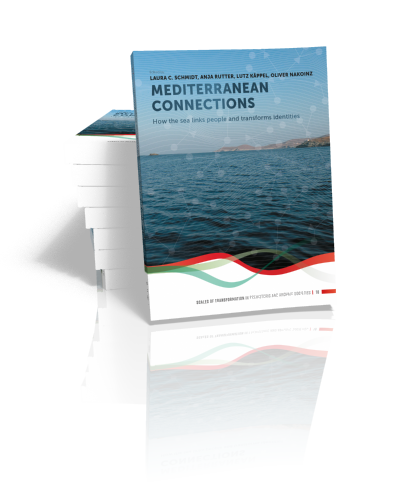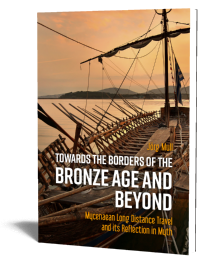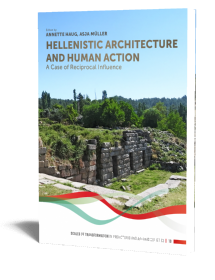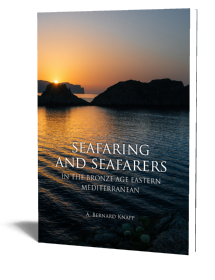Mediterranean Connections
How the sea links people and transforms identities
Edited by Laura C. Schmidt, Anja Rutter, Lutz Käppel & Oliver Nakoinz | 2023

Mediterranean Connections
How the sea links people and transforms identities
Edited by Laura C. Schmidt, Anja Rutter, Lutz Käppel & Oliver Nakoinz | 2023
Paperback ISBN: 9789464270693 | Hardback ISBN: 9789464270709 | Imprint: Sidestone Press Academics | Format: 210x280mm | 236 pp. | Scales of Transformation 18 | Series: Scales of Transformation | Language: English | 21 illus. (bw) | 20 illus. (fc) | Keywords: Mediterranean; transformation; connectivity; networks; seafaring; Classics; archaeology | download cover | DOI: 10.59641/i8m573bk
Read online or downloaded 1151 times
-
Digital & Online access
This is a full Open Access publication, click below to buy in print, browse, or download for free.
-
Buy via Sidestone (EU & UK)
-
Buy via our Distributors (WORLD)
For non-EU or UK destinations you can buy our books via our international distributors. Although prices may vary this will ensure speedy delivery and reduction in shipping costs or import tax. But you can also order with us directly via the module above.
UK international distributor
USA international distributor
-
Bookinfo
Paperback ISBN: 9789464270693 | Hardback ISBN: 9789464270709 | Imprint: Sidestone Press Academics | Format: 210x280mm | 236 pp. | Scales of Transformation 18 | Series: Scales of Transformation | Language: English | 21 illus. (bw) | 20 illus. (fc) | Keywords: Mediterranean; transformation; connectivity; networks; seafaring; Classics; archaeology | download cover | DOI: 10.59641/i8m573bk
Read online or downloaded 1151 times

We will plant a tree for each order containing a paperback or hardback book via OneTreePlanted.org.
The present publication constitutes the Proceedings of Session 7 of the ‘Creation of landscapes VI’ workshop, hosted by the CAU Kiel in 2019. The session was entitled ‘Mediterranean Connections – how the sea links people and transforms identities’.
With our focus on the linkage of people, this volume can be understood as a contribution to recent network research. But network research, especially when employed in the humanities, is often looked at with scepticism, not to say mistrust: Isn’t this just a game with numbers? Does it really relate to the type of data we are used to in our research, to poems, sherds or seal impressions? Can it say anything at all about… life?
In fact, the various articles of this volume are not restricted to the strict technical approach of classical network research. Our session on Mediterranean networks started from the idea that for the inhabitants of this relatively integrated region, the sea evidently influenced their lives and their thinking in a significant way. In fact, it was the sea that provided the medium for such integration on various levels. The substantial body of data produced by long-standing research in diverse disciplines makes it possible to chart the emergence of ancient perceptions of distance and movement, connectivity and identities. This approach allows us to observe ancient awareness of the role of the sea in these processes. It also allows us to connect across academic boundaries and build a network of disciplines for a much more cohesive picture of past life.
Foreword
Introduction
Anja Rutter, Laura C. Schmidt
Part 1: Identity of Centres and Peripheries
Seafaring and the Reception of (Some) Archaic Greek Lyric Poetry
Maria Noussia-Fantuzzi
Chalcidic connectivity between Sithonia and Pallene: transmutations of epichoric identity and resilience in the long 5th and 4th c. B.C.
Maria G. Xanthou
The importance of geography to the networked Late Bronze Age Aegean
Paula Gheorghiade, Henry Price, Ray Rivers
To be Greek or not to be: about the “Greekness” of Epirus and Southern Illyria. An overview through urbanism and theatrical architecture in a Mediterranean perspective
Ludovica Xavier de Silva
Frozen Wine and the frozen Black Sea. Ovid as Exiled Poet Faced with Climatic Extremes (trist. 3.10; Pont. 4.7; 4.9; 4.10)
Stefan Feddern
A Sea of Wine and Honey: networks of narratives as resources for the negotiation of identities, an heuristic approach in the Hellenistic Western Mediterranean
Raffaella Da Vela
Part 2: Connectivity by Sea and Networking of Seafarers
Seafaring Songs in Pindar’s Epinikia and Enkomia
Thomas Kuhn-Treichel
Maritime Cultural Landscapes of Fishing Communities in Roman Cyprus
Maria M. Michael, Carmen Obied
Sea Storms and Aristocratic Identity in Alcaeus
Ippokratis Kantzios
The Ideology of Seafaring in the Odyssey and Telemachos’ Hanging of the Slave Girls (Od. 22,461-474)
Hauke Schneider
Malta’s connections and cultural identity: remarks on the architectural language in the western Mediterranean in the 4th and 3rd centuries BCE
Francesca Bonzano
Becoming a Man Ashore – the Role of the Sea in Sappho’s Brothers Song
Laura C. Schmidt
Dr. Laura C. Schmidt
Laura Schmidt has studied Classics at the Christian-Albrechts University of Kiel and the Aristotle University of Thessaloniki. She defended her PhD thesis under the title “From Lesbos to Athens: Sappho’s Place in the Symposium and Greek Learning” in 2020. She has been member of the Graduate School ‘Human Development in Landscapes’ (2016-2020). She worked on Plato’s concept of optics at the CRC 1266 “Scales of Transformation” at Kiel (2020) and participated in the interdisciplinary project “Gardens, Human Senses and Eudaimonia” of the Cluster of Excellence ROOTS at Kiel (2021). She is currently researching the “thin Anthropocene” in classical antiquity as a member of the ROOTS Cluster of Excellence.

Prof. dr. Lutz Käppel
Studies of Classics in Tübingen and Oxford, PhD 1990, Habilitation 1997, Professor of Classics, especially Greek Literature at the Christian-Albrechts-Universität zu Kiel 1999-, Ordinary Member of the German Archaeological Institute 2000-, Dean of the Faculty of Humanities 2006-2008, Co-Coordinator of the Kiel Graduate School ‘Human Development in Landscapes’ 2007-2016; Speaker of the University’s Research Focus ‘Social, Environmental, Cultural Change’ 2007–.
Anja Rutter MA
Holding an MA in medieval history (Universität Bielefeld) and another in maritime archaeology (University of Southampton), Anja Rutter has been an interdisciplinary researcher from the outset. After gaining experience as a research diver and a field archaeologist, she is now writing her PhD on Bronze Age networks in the Levant at the Christian-Albrechts-University Kiel. Her main research focusses on networked identities, mental maps and the question of continuitiy in societies during and after upheaval and forced change.
As Anja Rutter also has long-time experience in museum didactics and citizen science, she has a special interest in making research accessible and understandable to the public and in the role the humanities can play in shaping our ideas of the future.
Prof. Dr. Oliver Nakoinz
Oliver Nakoinz is a lecturer at Kiel University. He obtained his PhD in 2004 with “Studien zur räumlichen Abgrenzung und Strukturierung der älteren Hunsrück-Eifel-Kultur” and his habilitation in 2010 with “Archäologische Kulturgeographie der ältereisenzeitlichen Zentralorte Südwestdeutschlands”. His work is focused on quantitative archaeology, landscape archaeology and interaction and connectivity, in particular in the Iron Age. Furthermore, he is dedicated to the idea of interdisciplinary integration and integrating theory and method.
Abstract:
The present publication constitutes the Proceedings of Session 7 of the ‘Creation of landscapes VI’ workshop, hosted by the CAU Kiel in 2019. The session was entitled ‘Mediterranean Connections – how the sea links people and transforms identities’.
With our focus on the linkage of people, this volume can be understood as a contribution to recent network research. But network research, especially when employed in the humanities, is often looked at with scepticism, not to say mistrust: Isn’t this just a game with numbers? Does it really relate to the type of data we are used to in our research, to poems, sherds or seal impressions? Can it say anything at all about… life?
In fact, the various articles of this volume are not restricted to the strict technical approach of classical network research. Our session on Mediterranean networks started from the idea that for the inhabitants of this relatively integrated region, the sea evidently influenced their lives and their thinking in a significant way. In fact, it was the sea that provided the medium for such integration on various levels. The substantial body of data produced by long-standing research in diverse disciplines makes it possible to chart the emergence of ancient perceptions of distance and movement, connectivity and identities. This approach allows us to observe ancient awareness of the role of the sea in these processes. It also allows us to connect across academic boundaries and build a network of disciplines for a much more cohesive picture of past life.
Contents
Foreword
Introduction
Anja Rutter, Laura C. Schmidt
Part 1: Identity of Centres and Peripheries
Seafaring and the Reception of (Some) Archaic Greek Lyric Poetry
Maria Noussia-Fantuzzi
Chalcidic connectivity between Sithonia and Pallene: transmutations of epichoric identity and resilience in the long 5th and 4th c. B.C.
Maria G. Xanthou
The importance of geography to the networked Late Bronze Age Aegean
Paula Gheorghiade, Henry Price, Ray Rivers
To be Greek or not to be: about the “Greekness” of Epirus and Southern Illyria. An overview through urbanism and theatrical architecture in a Mediterranean perspective
Ludovica Xavier de Silva
Frozen Wine and the frozen Black Sea. Ovid as Exiled Poet Faced with Climatic Extremes (trist. 3.10; Pont. 4.7; 4.9; 4.10)
Stefan Feddern
A Sea of Wine and Honey: networks of narratives as resources for the negotiation of identities, an heuristic approach in the Hellenistic Western Mediterranean
Raffaella Da Vela
Part 2: Connectivity by Sea and Networking of Seafarers
Seafaring Songs in Pindar’s Epinikia and Enkomia
Thomas Kuhn-Treichel
Maritime Cultural Landscapes of Fishing Communities in Roman Cyprus
Maria M. Michael, Carmen Obied
Sea Storms and Aristocratic Identity in Alcaeus
Ippokratis Kantzios
The Ideology of Seafaring in the Odyssey and Telemachos’ Hanging of the Slave Girls (Od. 22,461-474)
Hauke Schneider
Malta’s connections and cultural identity: remarks on the architectural language in the western Mediterranean in the 4th and 3rd centuries BCE
Francesca Bonzano
Becoming a Man Ashore – the Role of the Sea in Sappho’s Brothers Song
Laura C. Schmidt
Dr. Laura C. Schmidt
Laura Schmidt has studied Classics at the Christian-Albrechts University of Kiel and the Aristotle University of Thessaloniki. She defended her PhD thesis under the title “From Lesbos to Athens: Sappho’s Place in the Symposium and Greek Learning” in 2020. She has been member of the Graduate School ‘Human Development in Landscapes’ (2016-2020). She worked on Plato’s concept of optics at the CRC 1266 “Scales of Transformation” at Kiel (2020) and participated in the interdisciplinary project “Gardens, Human Senses and Eudaimonia” of the Cluster of Excellence ROOTS at Kiel (2021). She is currently researching the “thin Anthropocene” in classical antiquity as a member of the ROOTS Cluster of Excellence.

Prof. dr. Lutz Käppel
Studies of Classics in Tübingen and Oxford, PhD 1990, Habilitation 1997, Professor of Classics, especially Greek Literature at the Christian-Albrechts-Universität zu Kiel 1999-, Ordinary Member of the German Archaeological Institute 2000-, Dean of the Faculty of Humanities 2006-2008, Co-Coordinator of the Kiel Graduate School ‘Human Development in Landscapes’ 2007-2016; Speaker of the University’s Research Focus ‘Social, Environmental, Cultural Change’ 2007–.
Anja Rutter MA
Holding an MA in medieval history (Universität Bielefeld) and another in maritime archaeology (University of Southampton), Anja Rutter has been an interdisciplinary researcher from the outset. After gaining experience as a research diver and a field archaeologist, she is now writing her PhD on Bronze Age networks in the Levant at the Christian-Albrechts-University Kiel. Her main research focusses on networked identities, mental maps and the question of continuitiy in societies during and after upheaval and forced change.
As Anja Rutter also has long-time experience in museum didactics and citizen science, she has a special interest in making research accessible and understandable to the public and in the role the humanities can play in shaping our ideas of the future.
Prof. Dr. Oliver Nakoinz
Oliver Nakoinz is a lecturer at Kiel University. He obtained his PhD in 2004 with “Studien zur räumlichen Abgrenzung und Strukturierung der älteren Hunsrück-Eifel-Kultur” and his habilitation in 2010 with “Archäologische Kulturgeographie der ältereisenzeitlichen Zentralorte Südwestdeutschlands”. His work is focused on quantitative archaeology, landscape archaeology and interaction and connectivity, in particular in the Iron Age. Furthermore, he is dedicated to the idea of interdisciplinary integration and integrating theory and method.
-
Digital & Online access
This is a full Open Access publication, click below to buy in print, browse, or download for free.
-
Buy via Sidestone (EU & UK)
-
Buy via our Distributors (WORLD)
For non-EU or UK destinations you can buy our books via our international distributors. Although prices may vary this will ensure speedy delivery and reduction in shipping costs or import tax. But you can also order with us directly via the module above.
UK international distributor
USA international distributor
- Browse all books by subject
-
Search all books

We will plant a tree for each order containing a paperback or hardback book via OneTreePlanted.org.
You might also like:
© 2025 Sidestone Press KvK nr. 28114891 Privacy policy Sidestone Newsletter Terms and Conditions (Dutch)








